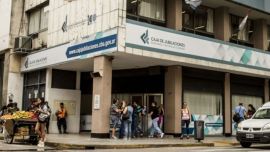Argentina's black market exchange rate plunged to a record low this week as people are bought dollars ahead of their holidays and a recent Central Bank resolution drained fresh dollar bills from visiting tourists at exchange houses.
The street rate, known locally as the “dólar blue” or "blue dollar", plunged to 357 pesos to the dollar on Thursday, according to the Dolarhoy.com website. The exchange rate, which is widely used to circumvent capital controls, fell nine percent last week. The official rate, tightly controlled by the Central Bank, is 176 pesos.
The risk for the authorities is that the sudden drop will spread to other sectors of the economy, as the exchange rate is used as a benchmark for some imported consumer goods and transactions. The country already faces annual inflation rate approaching 100 percent and a chronic deficit of dollars needed to finance trade and prop up the currency.
"The rise of the blue dollar is the most relevant data for the macroeconomy," PPI analysts led by Pedro Siaba Serrate wrote in a note to clients on Wednesday. "The rise in the blue dollar could obviously be an early indicator of what the other financial exchange rates will do."
The extension of foreign exchange controls in Argentina has generated many differing exchange rates for sectors such as farmers, tourists and even concert tickets to pay for foreign musical events.
One of the most recent changes in exchange rate policies is to offer foreign tourists a better rate when they use their foreign credit cards locally, one of close to 333 pesos to the dollar. This has meant that fewer US$100 notes are exchanged at informal exchange houses and, in turn, fewer dollars are available for Argentines to buy.
The CCL ('contado con liquidación') dollar, another parallel exchange rate derived from buying securities locally and selling them abroad, weakened to 348 pesos to the dollar, also a record high.
Another factor behind the weakness on the black market is that a fee for Argentines to use credit cards abroad became too expensive compared to buying dollars on the street before boarding a plane.
PPI estimates the currency's value today is closer to 425 to the dollar, based on a calculation involving the amount of pesos in circulation.
by Ignacio Olivera Doll, Bloomberg



















Comments